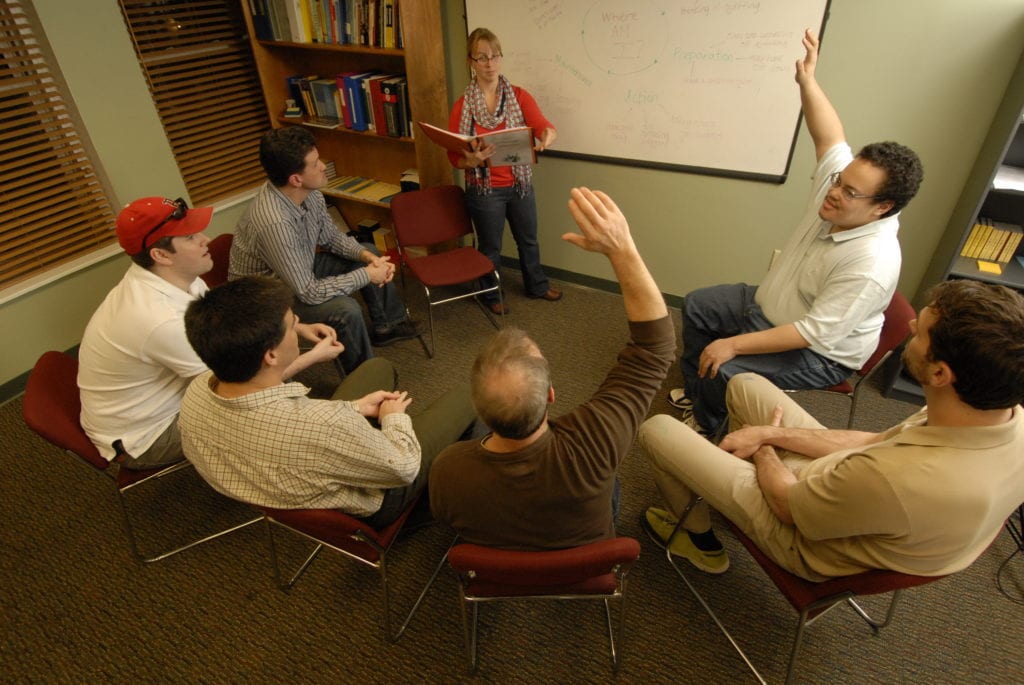 Where are you located?
Where are you located?
We are located in Manchester, New Hampshire. We offers both Residential and Community Integration Programs.
How long have you been in existence?
WestBridge has been providing services to adult men and their families since 2001.
Who does WestBridge treat?
WestBridge provides treatment for adults (at least 18 years old) and their families who experience symptoms of mental illness, with or without substance use. We often work with individuals who are ambivalent about addressing either or both their mental illness and substance use. Utilizing a perspective of meeting each individual where they are at, we individualize the treatment around them, rather than having each person fit into a specific treatment program.
Do you take participants from anywhere in the country?
Yes. We accept referrals from anywhere in the United States and sometimes internationally.
WestBridge’s goal is to be as thoughtful as possible when admitting a new participant. We strive to be responsive and efficient as well. We want the admission process to provide your family with all of the information about our program, as well as gather all the appropriate information from your family so that we can determine if WestBridge is the best fit for your particular situation.
Who do I call in an emergency?
WestBridge staff members share responsibility for being accessible to participants and families twenty-four hours per day. Each WestBridge program has emergency contacts specific to that program. In any life-threatening emergency your first call should be 9-1-1.
Do you take calls after hours?
In our Residential Treatment Program and Community Integration Program (CIP), someone from our staff is on-call 24 hours per day to handle emergencies that pertain to current participants.
In our other programs, we are available during normal business hours, 8:00 am – 4:30 pm, and local emergency services can be utilized after hours.
Will you involve us in our family member’s care?
It is our belief that the most effective care is that which involves the people who are supportive of a person.
In our Residential Treatment Program and Community Integration Program, we expect every family to take part in weekly Family Education and Support (FES) sessions (via conference call or in person).
Occasionally issues of confidentiality prevent us from sharing certain information, however, we will work continuously to keep lines of communication open by keeping updated releases of information and reinforcing the importance of family involvement with your loved one.
Men’s Residential Treatment
How long does a participant typically stay in your residential programs?
Men in our residential program typically stay anywhere from 3-6 months, but as not all our participants’ needs are the same, this is determined on an individual basis. Some stays may be shorter, some may be longer. After the first month in the residential program, the clinical team will make recommendations to the participant and their family. Recommendations may include staying further in the residential program and will be continually and consistently evaluated to determine an appropriate discharge date for each participant.
What happens after Men’s Residential Treatment?
As a participant’s stay nears the end, the participant works with their team to devise a Transition Plan. Sometimes Transition Plans involve returning to their hometown or state, sometimes participants choose to remain in the Manchester, NH area and continue with our continuum of care. Either way, WestBridge assists a participant and family with making the transition a safe, smooth and productive one.
Community Integration Program (CIP) (open to direct admissions or step-downs from WestBridge’s residential program)
How much time will be devoted to my family member’s care when they enter Community Integration Program (CIP)?
Each participant and family of WestBridge has individualized needs for care. Some may require several hours per day while others may require less intensive care. Each care plan, including the number of hours of service to be provided, is tailored to the individual needs of a participant and family. Before services begin, the number of hours of service to be provided will be jointly decided by WestBridge staff, participants, and family members.
Intensive Outpatient Program (IOP) for all Genders
How is your Intensive Outpatient Program (IOP) structured?
Adults of all genders participate in treatment for 3 hours per day (weekdays), up to 3 days per week. Available services include group therapy, case management, individual therapy, family support, and psychiatric consultation as appropriate. As a next step for people completing our program, we support making connections to outpatient providers.







